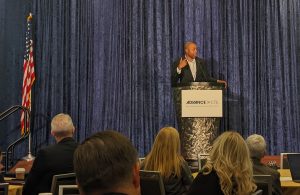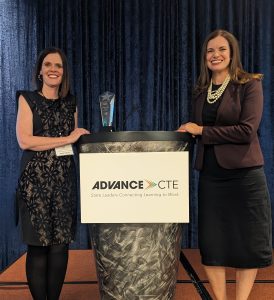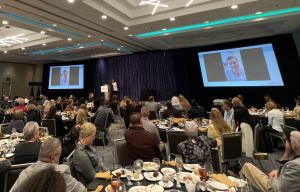This year, we welcomed over 200 attendees for the Advance CTE Fall Meeting in Baltimore, Maryland to make meaningful connections and ignite innovation to Elevate Career Technical Education’s (CTE) Impact. Our general sessions featured leaders from across the CTE community who are going above and beyond to ensure each learner can achieve CTE without limits.
Keynote: The Work Ahead – CTE and the Future of Work
 Our keynote speaker was Chike Aguh, an education and workforce development innovator who is a former Chief Innovation Officer at the U.S. Department of Labor and currently a Senior Advisor for the Project on Workforce Harvard. Chike set the tone for Fall Meeting early by sharing how his parents, first-generation immigrants to the U.S., had CTE-connected careers, which paved the way for his own success which included serving the President of the United States. Chike knows that more remarkable stories like this are made possible because of the work that CTE leaders do. His presentation explored the question:
Our keynote speaker was Chike Aguh, an education and workforce development innovator who is a former Chief Innovation Officer at the U.S. Department of Labor and currently a Senior Advisor for the Project on Workforce Harvard. Chike set the tone for Fall Meeting early by sharing how his parents, first-generation immigrants to the U.S., had CTE-connected careers, which paved the way for his own success which included serving the President of the United States. Chike knows that more remarkable stories like this are made possible because of the work that CTE leaders do. His presentation explored the question:
What world are we preparing our learners for, and how does Career Technical Education prepare them for it?
Chike’s message was clear – the world of work is changing dramatically and CTE needs to meet the challenge. Some changes have already happened, such as automation and remote work from industries ranging from loan administration to transportation. Other changes are yet to come, and they continue to profoundly change and in some cases put at risk jobs that Americans rely on.
The way CTE responds to these challenges, according to Chike, is by equipping learners with both “timeless” skills and “just in time” skills. These skills don’t just make learners prepared for the workforce, they make them economically indispensable.
One resonating message from Chike is that “‘Career Technical Education’ is too small a term for what CTE leaders are doing and what they need to do”. He applauded CTE leaders and educators for the work that they do every day, yet stressed the hard work that lies ahead for CTE in empowering the workforce of the future.
Star of Education Awards
Fall Meeting also served as an opportunity to celebrate state CTE leaders who are making significant contributions to elevating CTE’s impact in their state.
 The State CTE Leadership Rising Star Award, awarded to Amy Miller, recognizes new CTE leaders who are actively engaged with and dedicated to advancing a vision for CTE that is committed to quality, equity and access within their state. Miller began her role as Assistant Director of CTE at the South Dakota Department of Education in 2020 following a career as a family and consumer science teacher, CTE director and high school principal.
The State CTE Leadership Rising Star Award, awarded to Amy Miller, recognizes new CTE leaders who are actively engaged with and dedicated to advancing a vision for CTE that is committed to quality, equity and access within their state. Miller began her role as Assistant Director of CTE at the South Dakota Department of Education in 2020 following a career as a family and consumer science teacher, CTE director and high school principal.
The State CTE Distinguished Leadership Award, awarded to Dr. Sarah Heath, recognizes current and former state CTE leaders who have a distinguished and tenured history of service and have demonstrated the highest level of commitment to advancing a vision for high-quality and equitable CTE at the state and national levels. Dr. Heath, who served as President of the Advance CTE Board of Directors from 2020-2022, has held the title of Associate Vice Chancellor for CTE and State CTE Director in Colorado since 2015 following positions as a computer science and business educator, state program director and local system administrator.
 In their acceptance remarks, both leaders emphasized the importance of their state and local partners’ shared commitment to innovation and the needs of learners as central to their success. Dr. Heath in particular elevated the unique community of the “CTE family” that connects leaders across the country.
In their acceptance remarks, both leaders emphasized the importance of their state and local partners’ shared commitment to innovation and the needs of learners as central to their success. Dr. Heath in particular elevated the unique community of the “CTE family” that connects leaders across the country.
Preparations are already underway for the Advance CTE 2024 Spring Meeting in Arlington, Virginia from April 29-May 1, 2024! Visit the event page to mark your calendar and learn more.
Layla Alagic, Digital Communications Associate
Stacy Whitehouse, Associate Director, Communications


 As a State Career and Technical Education (CTE) leader, you know the value of CTE in preparing learners for a wide range of work opportunities. But to elevate CTE’s impact, it’s essential to use your expertise to build programs that grow and thrive.
As a State Career and Technical Education (CTE) leader, you know the value of CTE in preparing learners for a wide range of work opportunities. But to elevate CTE’s impact, it’s essential to use your expertise to build programs that grow and thrive. By nature, educators are deeply attuned to the needs of their learners—and often even the needs of their families. But these days, many educators are navigating how to respond to the often-increased needs and greater numbers of crises within (and sometimes outside of) their classroom ecosystems. Where is the game plan for—as we are frequently reminded—these unprecedented times?
By nature, educators are deeply attuned to the needs of their learners—and often even the needs of their families. But these days, many educators are navigating how to respond to the often-increased needs and greater numbers of crises within (and sometimes outside of) their classroom ecosystems. Where is the game plan for—as we are frequently reminded—these unprecedented times? Holly Atha,
Holly Atha, 